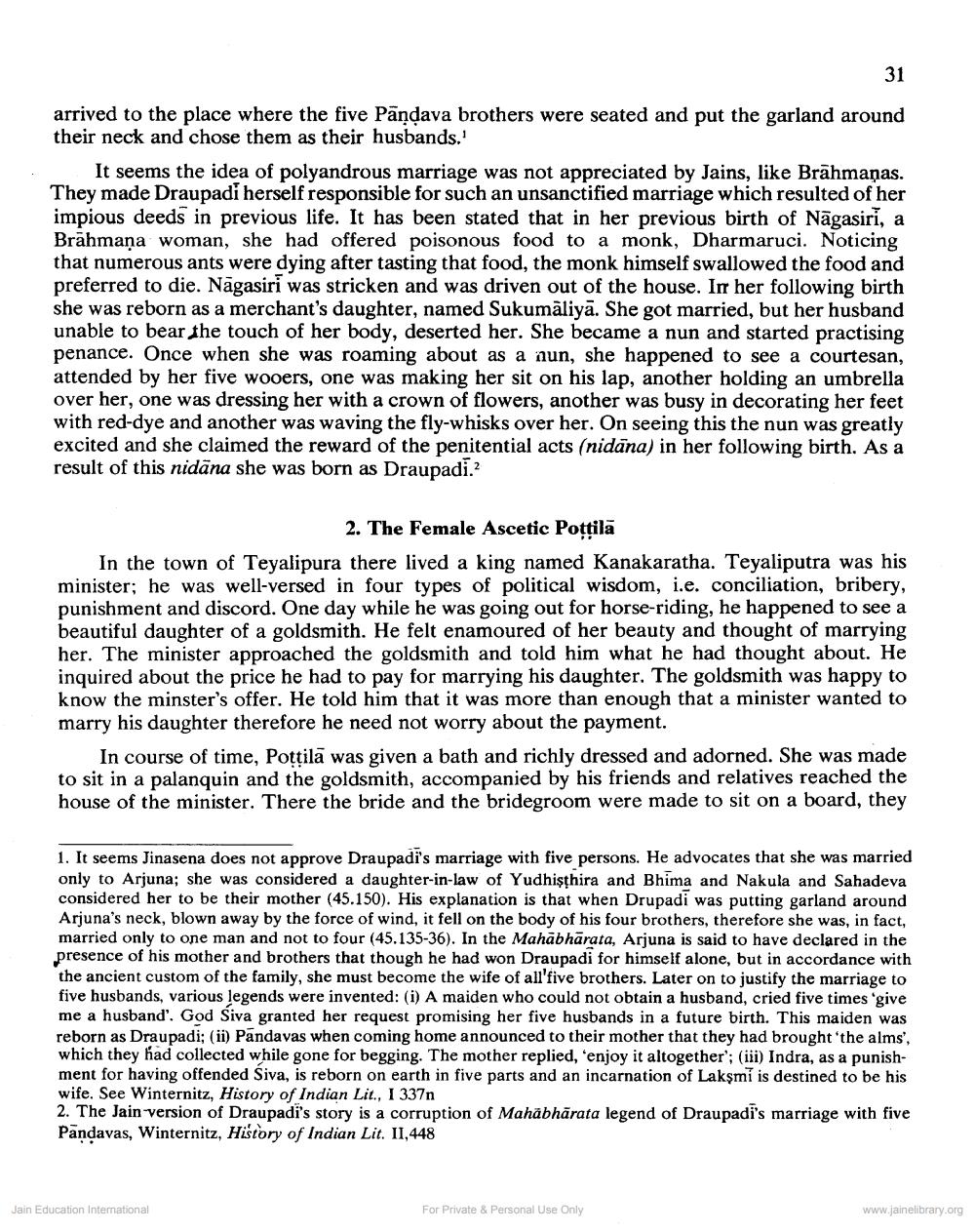________________
arrived to the place where the five Pandava brothers were seated and put the garland around their neck and chose them as their husbands.
It seems the idea of polyandrous marriage was not appreciated by Jains, like Brahmaņas. They made Draupadi herself responsible for such an unsanctified marriage which resulted of her impious deeds in previous life. It has been stated that in her previous birth of Nāgasirī, a Brahmana woman, she had offered poisonous food to a monk, Dharmaruci. Noticing that numerous ants were dying after tasting that food, the monk himself swallowed the food and preferred to die. Nagasiri was stricken and was driven out of the house. Irr her following birth she was reborn as a merchant's daughter, named Sukumäliyā. She got married, but her husband unable to bear the touch of her body, deserted her. She became a nun and started practising penance. Once when she was roaming about as a nun, she happened to see a courtesan, attended by her five wooers, one was making her sit on his lap, another holding an umbrella over her, one was dressing her with a crown of flowers, another was busy in decorating her feet with red-dye and another was waving the fly-whisks over her. On seeing this the nun was greatly excited and she claimed the reward of the penitential acts (nidāna) in her following birth. As a result of this nidāna she was born as Draupadi.?
2. The Female Ascetic Pottila In the town of Teyalipura there lived a king named Kanakaratha. Teyaliputra was his minister; he was well-versed in four types of political wisdom, i.e. conciliation, bribery, punishment and discord. One day while he was going out for horse-riding, he happened to see a beautiful daughter of a goldsmith. He felt enamoured of her beauty and thought of marrying her. The minister approached the goldsmith and told him what he had thought about. He inquired about the price he had to pay for marrying his daughter. The goldsmith was happy to know the minster's offer. He told him that it was more than enough that a minister wanted to marry his daughter therefore he need not worry about the payment.
In course of time, Pottilā was given a bath and richly dressed and adorned. She was made to sit in a palanquin and the goldsmith, accompanied by his friends and relatives reached the house of the minister. There the bride and the bridegroom were made to sit on a board, they
1. It seems Jinasena does not approve Draupadi's marriage with five persons. He advocates that she was married only to Arjuna; she was considered a daughter-in-law of Yudhişthira and Bhima and Nakula and Sahadeva considered her to be their mother (45.150). His explanation is that when Drupadi was putting garland around Arjuna's neck, blown away by the force of wind, it fell on the body of his four brothers, therefore she was, in fact, married only to one man and not to four (45.135-36). In the Mahābhārata, Arjuna is said to have declared in the presence of his mother and brothers that though he had won Draupadi for himself alone, but in accordance with the ancient custom of the family, she must become the wife of all'five brothers. Later on to justify the marriage to five husbands, various legends were invented: (i) A maiden who could not obtain a husband, cried five times 'give me a husband'. God Siva granted her request promising her five husbands in a future birth. This maiden was reborn as Draupadi; (ii) Pandavas when coming home announced to their mother that they had brought 'the alms', which they had collected while gone for begging. The mother replied, enjoy it altogether'; (iii) Indra, as a punishment for having offended Siva, is reborn on earth in five parts and an incarnation of Lakşmi is destined to be his wife. See Winternitz, History of Indian Lit., I 337n 2. The Jain version of Draupadi's story is a corruption of Mahābhārata legend of Draupadi's marriage with five Pandavas, Winternitz, History of Indian Lit. 11,448
Jain Education International
For Private & Personal Use Only
www.jainelibrary.org




